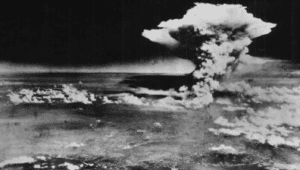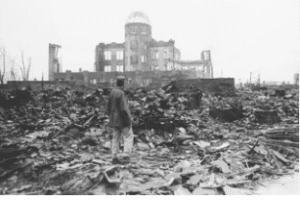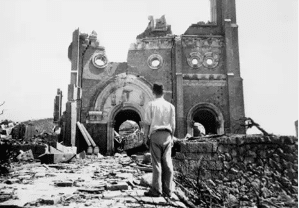Keywords:
Nagasaki bombing, Fat Man atomic bomb, World War II history, August 9, 1945, Bockscar mission, Hiroshima and Nagasaki, nuclear warfare impact, historical events, Preeti Verma Lal, World War II news, atomic bomb effects, peace and disarmament
Seventy-nine years ago, on August 9, 1945, the world witnessed a monumental and tragic event when the United States dropped an atomic bomb named ‘Fat Man’ on Nagasaki. This catastrophic attack resulted in the immediate deaths of approximately 40,000 people and left the city in ruins.
The Mission and Its Challenges
The events leading up to this fateful day began early in the morning at Tinian Island. At 3:47 AM, the US B-29 bomber, Bockscar, under the command of Major Charles W. Sweeney, embarked on its mission carrying the plutonium-type atomic bomb, ‘Fat Man’. The primary target was Kokura Arsenal, a crucial war production center near Kokura. However, the mission faced significant hurdles from the outset.

Weather conditions were adverse, with smoke and haze severely limiting visibility over Kokura. Additionally, Major Sweeney discovered that accessing reserve fuel was not feasible. With deteriorating conditions and insufficient fuel to return to the Okinawa airfield, the crew faced a critical decision. Kokura was no longer a viable target, and Nagasaki, the secondary target, became the focus of the mission.
The Devastation of Nagasaki
As Bockscar approached Nagasaki, the city was partially obscured by clouds. Minutes before 11 AM, Captain Kermit K. Beahan, the bombardier, briefly glimpsed Nagasaki’s stadium through the overcast. Despite the limited visibility, the decision was made to proceed with the mission.
The bomb was released and detonated over Nagasaki, causing immense destruction and a tragic loss of life. The bombing of Nagasaki occurred just three days after the atomic bomb was dropped on Hiroshima, marking the second use of nuclear weapons in warfare and playing a crucial role in the eventual end of World War II.
Reflecting on History
The bombings of Hiroshima and Nagasaki remain profound and somber chapters in history, with enduring effects on global politics, ethics, and human lives. The impact of these events continues to resonate, prompting reflection on the devastating consequences of nuclear warfare.
However, the mission encountered several challenges. The weather over Kokura was poor, with heavy smoke and haze obstructing visibility. Furthermore, Major Sweeney realized that accessing the reserve fuel was not an option, which meant that returning to the Okinawa airfield was no longer feasible. The crew’s dilemma was clear: the primary target could not be bombed under these conditions.

The Decision to Bomb Nagasaki
With the Kokura target compromised, Nagasaki, which was the secondary target, became the new focus. As Bockscar approached Nagasaki, the crew faced significant visibility issues. The bombardier, Captain Kermit K. Beahan, managed to catch a fleeting view of the city’s stadium through the clouds. Despite the challenging conditions, the decision was made to proceed with the bombing.
At approximately 11:02 AM, ‘Fat Man’ was dropped over Nagasaki. The bomb exploded with a force equivalent to 21 kilotons of TNT, causing widespread devastation. The immediate blast and subsequent fires resulted in the deaths of around 40,000 people, with many more injured and the city’s infrastructure severely damaged. Nagasaki’s geographic features, including hills and valleys, somewhat mitigated the extent of the destruction compared to Hiroshima, but the impact was still catastrophic.
The Aftermath and Historical Significance
The bombing of Nagasaki occurred just three days after the first atomic bomb was dropped on Hiroshima on August 6, 1945. These bombings were instrumental in bringing about the end of World War II, with Japan announcing its surrender on August 15, 1945. The use of atomic bombs on Hiroshima and Nagasaki remains one of the most controversial decisions in military history, raising ethical questions about the use of nuclear weapons and their devastating impact on civilian populations.
The bombings have had lasting implications for global politics and warfare, leading to a new era of nuclear arms control and an ongoing dialogue about the ethics of nuclear weaponry. The cities of Hiroshima and Nagasaki have become symbols of the horrors of nuclear war and the resilience of the human spirit.
Remembering the Impact
As we reflect on the events of August 9, 1945, it is important to remember the profound impact on the lives of those affected and to continue advocating for peace and disarmament to prevent such tragedies in the future.
